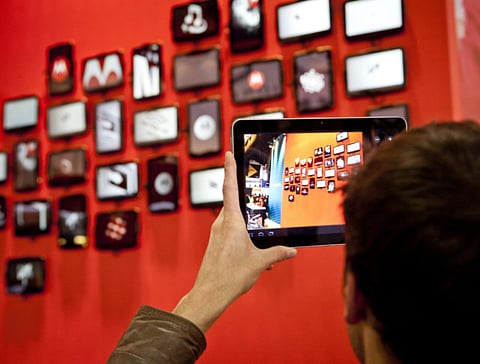Rumours and swipes
GN Focus looks at the new releases that the industry believes may be launched at the Mobile World Congress

Tablets are expected to dominate the Mobile World Congress (MWC), running from February 25-28, in Barcelona, manufacturers said at last month’s Consumer Electronics Show (CES) in Las Vegas, which was the scene of much excitement in the sector.
High-profile announcements at CES included Panasonic’s 20-inch 4K resolution Windows 8 tablet, Lenovo’s table-sized 27-inch tablet, and Asus’ Android/Windows 8 Transformer hybrid, which features two discrete processors. The platform continues to evolve rapidly with super-high resolutions, flexible devices such as the Paper Tab (see box) and new learning systems.
However, ahead of the Barcelona show, more than a few tablet developments have been confirmed. We examine some of the news and whispers about MWC launches and beyond.
Samsung
Samsung will show off a Galaxy Note 8 tablet at MWC, according to a report from Inews24.com, which quotes the company’s Vice-President J.K. Shin.
Shin did not confirm any specs for the new tablet, but it is expected to have an 8-inch Super-Clean LCD capacitive touch screen display, 1.6GHz quad-core Exynos 4412 processor, micro SD card slot, 16GB/32GB internal storage, 2GB RAM, Android 4.2 Jelly Bean operating system, five-megapixel rear camera, a 4,600mAh battery and S Pen support.
With this product, Samsung appears to be moving in on the 7.9-inch iPad mini, an area where it has lagged behind Amazon and Google so far.
Rumours also focus on two other tablets, the Galaxy Tab 10.1 and the Galaxy Tab 3 Plus, similar to the Tab 3 10.1 in size, but reportedly with a 2560x1600 display instead of a 1280x800 one.
Asus
The Taiwanese manufacturer has said that it has huge plans for Barcelona. Asus is expected to launch a third item in its PadFone series in Barcelona. The unique smartphone-tablet hybrid was launched in September last year and the successor to the device debuted a month later.
The PadFone 2 has sold one million units worldwide in just three months. The new product is likely to be seven inches and may be called the Fonepad K004, according to Androidauthority.com, which cited database information from Postel Indonesia. The Fonepad K004, which was code-named ME371MG earlier, will be Intel-powered with the new Atom Z220 chip. High-definition displays and Jelly Bean may be its other specs.
Nokia
Any doubt about Finnish giant Nokia’s entrance into the tablet market can now be dismissed. Speaking to the Australian Financial Review, Nokia’s CEO Stephen Elop says the company is looking very closely at tablets.
He has not confirmed that the new model will be presented at MWC, but there is widespread speculation that this is the case, since the company has sent out invites for a conference on the first day of the event.
The recent buzz about Nokia’s devices is that the company is working on a Windows RT tablet, which is expected to sit alongside the Lumia range of handsets. The rumoured tablet will have HDMI and USB ports along with a 10.1-inch display, a kickstand and a battery-equipped keyboard cover.
Elop hinted that Nokia’s future participation in the tablet market could depend on the success of Microsoft’s Surface. “We haven’t announced tablets at this point, but it is something we are clearly looking at very closely,” he said. “We are studying the market right now as Microsoft has introduced the Surface tablet. We are trying to learn from that and understand what the right way to participate would be and at what point in time.” Nokia’s past tablets include a series of Linux-powered internet tablets.
Toshiba
Toshiba has not confirmed a release yet but Digitimes reports that the Japanese manufacturer is the first player to integrate the Nvidia Tegra 4 processor into its products.
The chip was only unveiled a few weeks ago at CES, but it will also reportedly power the cheaper Vizio 10-inch Android tablet.
Other vendors, such as Acer and Asus, have yet to sign on.
